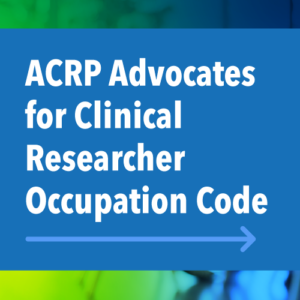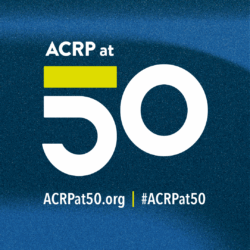Earlier this year, the U.S. Bureau of Labor Statistics (BLS) announced a review of the 2018 Standard Occupational Classification (SOC) Manual for possible revision in 2028.
As part of this process, the BLS solicited comments on the option to develop definitions for major occupation groups. This review and revision process is intended to be completed by 2027 and implemented in the 2028 reference year.
This was the opportunity that the Association of Clinical Research Professionals (ACRP) had been waiting for—the chance to request the establishment of a new detailed occupation code for the role of Clinical Researcher under the 29-0000 Healthcare Practitioners and Technical Occupations code.
With the invaluable contributions of ACRP’s Professionals Advancing the Clinical Research Workforce (PACRW) Consortium, we developed and submitted a detailed comment letter on August 8, 2024, to the U.S. Bureau of Labor Statistics advocating for this critical update.
Brief highlights are noted here, but we encourage you to read the comprehensive submitted letter for the full rationale.
- Clinical research brings us new medicines and medical devices
- Clinical research is the global industry behind clinical trials and public health research. This industry drives the development of new prescription medicines and new medical devices for human use, carefully assessing their safety and effectiveness.
- Clinical researchers are distinct from other healthcare workers
- The remit of clinical researchers is to ensure that clinical research is conducted in accordance with rigorous scientific and ethical laws and guidelines, designed to protect trial participants and to safeguard data quality. To the best of our knowledge, the BLS SOC categories provide no indication of the existence of a large group of interrelated jobs dedicated to the field of clinical research.
- The clinical research occupation has changed significantly—and continues to transform
- Catalyzed by the COVID-19 pandemic, new and innovative technology platforms are helping to streamline elements of research. As a result, the job of the clinical researcher has become more complex, requiring additional and specialized training across multiple software platforms especially designed for trial management and data collection.
- Clinical research is an essential occupation that is currently in crisis
- Clinical research is an essential occupation with distinctive skills and training requirements. Unfortunately, there is a severe shortage in the workforce and the situation has now reached a crisis point with the potential to curtail medical advances for years to come. Diversity in this profession is also needed to ensure representation among clinical research participants.
- Many organizations and initiatives are dedicated to the field of clinical research
- ACRP is the leading non-profit dedicated to representing, supporting, and advocating for clinical researchers and their contributions to improving public health. Multiple other professional groups, trade associations, and consortia are dedicated to clinical research, including the including the Multi-Regional Clinical Trials (MRCT) Center; Clinical Trials Transformation Initiative (CTTI); Consortium of Academic Programs in Clinical Research (CoAPCR); Decentralized Trials & Research Alliance (DTRA); and Society for Clinical Research Sites (SCRS).

“We are incredibly grateful for the time, expertise, and insights provided by our PACRW members, which were instrumental in shaping our message and making a strong case for the recognition of clinical researchers,” said Susan Landis, ACRP Executive Director. “We also shared the finalized comment letter with ACRP’s key collaborators, ensuring broad alignment and support for this initiative. This milestone reflects our collective effort to advance the identity and visibility of the clinical research profession.”
In conclusion, ACRP strongly encouraged the U.S. Bureau of Labor Statistics to recognize the distinct role of clinical research by introducing a new detailed SOC Code under the Healthcare Professionals classification.
Why Is This Important?
- The SOC Code for clinical research would improve visibility and recognition of this occupation, helping to track and address the current severe shortage of qualified clinical researchers and advance medical research to the benefit of public health.
- By effectively putting clinical research “on the map,” the new SOC would support purposeful choice of clinical research as a career option, including by individuals from diverse populations.
- Data collection for this new SOC code would improve understanding of the make-up of the clinical research workforce, including its demographics, its challenges, and its contribution to healthcare.
Finally, the new code would maintain the utility and continuity of the data that characterize and monitor this essential workforce. This would also allow for more accurate analysis and would inform policymaking for employers, researchers, sponsors, and lawmakers at national and state levels.
ACRP will share updates on this advocacy initiative with our community as we receive them.
ACRP membership directly supports our ability to take action for building a diverse, research-ready clinical research workforce that benefits all. Now more than ever before, our commitment to workforce development is imperative to the existence, quality, and efficiency of clinical research and the inclusion of more diverse clinical trial participants. Learn how ACRP is here to advance YOU—in every stage of your career. Become a member today >



